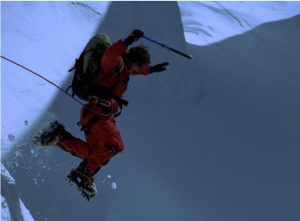Survival tips for start-ups—taking a leaf out of Bear Grylls’ book
by Sunil Bhat
Apr 13, 2020
7 min
As COVID-19 has pushed the start-up world into chaos, many are redrawing their survival strategy to deal with an unprecedented pandemic. This blog draws key lessons from survivalist Bear Grylls for start-ups to tide over these wild and uncharted times of crisis.
In his series titled “Man vs. Wild”, globe-trotting adventurer and wildlife enthusiast Bear Grylls demonstrates unusual techniques of survival while stranded in tough environments. These environments are either wholly unfamiliar for people or different from the ones they operate in. People are usually unprepared to handle the challenges posed by such hostile environments. Bear Grylls provides survival tips that come in handy to tide over such unplanned scenarios.
COVID-19 has pushed the start-up world into a similar type of chaos. Start-ups at different stages of their lifecycle are facing the heat. The magnitude of this extraordinary event has brought into question the very survival of these businesses and their strategies. This event is one of its kind in the past 100 years or more and has caught the start-up world off-guard. COVID-19 has bought the world down to its knees with almost simultaneous impact across multiple countries in the form of unprecedented lockdowns imposed by governments, numerous fatalities, disrupted businesses, and job losses. The fact that global economies are no longer disconnected has added to the strain.
Also sadly, to battle this chaos, start-ups have no precedence to follow and no book they can refer to. All they have are some words of wisdom from experts that further add to the commotion. For the start-up world, these challenging times can have a massive impact on their businesses and ultimately, their survival. Let us draw some parallels from Bear Grylls’ advice on survival in tough conditions.
Bear Grylls on the summit of Mt. Everest in 1998, aged 23. The youngest Brit at the time to climb the summit. (Courtesy: Bear Grylls Ventures)
- Preserve your supplies: Preserve cash and push the run-way further
In times of crisis, Bear makes the most of his limited supplies and preserves them for the unforeseen future. In this time where start-ups do not know when the tide will recede, they should take note of the following pointers:
- Preserve cash; liquidity will be at a premium in the short to medium term;
- Put any extravagant expenses like moving into a new office on hold;
- Go slow on hiring and recruit employees who can multi-task—a finance person, for example, who understands marketing;
- Push the run-way to at least 2x times (3 months to 6 months, from 6 to 12 months, and so on);
- Re-negotiate your contracts with suppliers and vendors because your customers are bound to re-negotiate with you!
- Tread cautiously on cash-backs and points-based rewards, among others;
- Drop the idea of launching products that need substantial research and incur high costs of development. Go for products that need only incremental spends, instead;
- Go with the adage “equity for capex, debt for opex and working capital.” However, for smaller start-ups, equity may be the only option. Besides, many start-ups lack clear rules around equity or debt, since money is anyways fungible;
- Do not stock up on inventory as this locks up capital. Re-orient processes to reduce the working capital gap;
- Build strategies based on the analysis of risk-based scenarios.
- Any water is better than no water: Look for funding from any source—institutional or individual
You would have seen Bear looking for all possible sources of potable water, which is a life-saving element in times of distress. Similarly, start-ups need to keep an eye out for any possible source of funding. It is common knowledge that funding sources will dry up, at least in the short term, since most investors are worried about their portfolios and will prefer to wait and watch. Moreover, first loss default guarantees (FLDGs) from banks or NBFCs would be nearing the 100% mark, which would make lives tough for lending start-ups. Here are some ways to keep hydrated:
- Look for impact investors;
- Try to secure small amounts from multiple sources;
- Explore crowdfunding opportunities—mainly for social sector start-ups;
- Look for individual investors – including family and friends (but be aware of the social implications of this route which may include reduced control, nepotism, buy from specific suppliers, and if all goes wrong, lose of face and friendship)
- Be willing to pay a higher FLDG to keep the start-up running and re-negotiate as soon as things start to look better.
- Beware of snares: Beware of new partners and relationships—everyone wants to make a quick buck
Bear is extremely cautious of the snares and traps laid out for wild animals by hunters in the wild. Even a slight oversight can cause irreparable damage. In these times of trial, start-ups may be lured into partnerships that may harm their business interests in the long run. Hence, they should resist moves that are “penny-wise and pound-foolish.” Here are some quick tips to avoid these snares:
- Conduct adequate due diligence of any new partner or vendor;
- Conduct adequate due diligence before diluting equity and read all covenants carefully;
- Negotiate hard and ensure that you get what you are looking for. This mainly applies to CAPEX-type investments;
- Be careful while onboarding new equity partners—diluting equity at the cost of the vision statement may not be a great bargain;
- Be careful when negotiating for FLDGs with smaller NBFCs. You run the risk of getting a smaller return while taking higher risks.
- Depend on your tools: Lean on your core employees—they are your precious resources
Bear depends heavily on his survival kit that includes everything from pliers and a flashlight to knives and ropes. Keeping these tools in order is important to survive in the wild. How many start-ups think of employees as their trusted resources / tools? In times such as these, it is necessary to retain valuable employees. As they say- Cut fat (discretionary spend) and preserve muscle (retain core employees). Some tips here:
- Communicate with employees about the hardships and the path ahead. Inform them about all major decisions to gain their confidence;
- Always speak of the proverbial “light at the end of the tunnel.” This is essential because many employees fail to maintain positivity, which affects their performance, drive, and commitment at work;
- Show empathy towards employees, which will go a long way in cementing relationships;
- Demonstrate responsible leadership with lenders, customers, and investors. This will enhance your reputation with the staff;
- Provide opportunities for online training and certifications, among others, if the time and resources permit;
- Delegate responsibilities—ask the employees to fight smaller battles in line with their capacities and laud every victory;
- Motivate, support, and empower your team.
- Be agile: Keep your ears to the ground
At its core, agility is decision-making on the go. Bear, too, demonstrates that agility in non-native environments pays off. Watching your back helps ward-off unexpected attacks. The principles of agility (OODA) for start-ups become all the more important during these uncertain times.
Source: The Essence of Winning and Losing, John R. Boyd
Experts suggest that start-ups must remain agile around the clock. Agile development is a part of lean management prescribed for all start-ups. In these tough times, start-ups can benefit from some of the points mentioned below:
- Look for cues / information in social media;
- Look for changes in guidelines, regulations, and policies;
- Look for changes in taxation sops and dates to file taxes;
- Connect with your customers quite often—try to understand their pain points and consider tweaking your offerings;
- Observe the direction in which the markets move and take note of any changes in the financial position of your country;
- Keep an eye on what other start-ups are doing—observe how they cut costs, raise funds, and maintain a connect with their customers.
- Exercise and meditate: Take care of your health
In the wild, Bear Grylls is quick, coordinated, and powerful. This is only possible through his regime of a healthy diet and rigorous exercise. However, this is generally the last thing recommended to start-ups. The journey of a start-up is demanding and the burn-out rates quite high. In testing times as these, this rate of burning out is even quicker and sometimes irreversible. The pressure to keep the start-up ticking while providing answers to both internal and external stakeholders may result in extreme levels of stress. To maintain their wellbeing, start-up promoters need to take care of themselves and allocate some time for routine exercises and meditation.
As goes the saying “it is not a sprint, it is a marathon”. In regular circumstances, building your company is both a sprint and a marathon. COVID-19 has re-set the very tracks of these sprints and marathons!
Downturns and challenges will keep testing the mettle of start-ups. However, COVID-19 is of a different magnitude and has been right defined as a black swan event and finding a perfect solution to manage its consequences will likey be a work-in-progress for quite some time.
Having said that, some start-ups are determined to turn this crisis into an opportunity. Like Bear, who has crafted rafts and used violent river currents to accelerate his journeys, some of MSC’s start-up partners are using this situation to their advantage by offering insurance products that secure their customers against COVID-19. Some others plan to make their transactions / processes completely digital to reduce costs and improve efficiencies. Let us not forget that some of the greatest start-ups that rule today, such as Uber, Airbnb, Square, and WhatsApp, among others, were born either during or soon after the global economic crisis of 2008.
MSC (MicroSave Consulting) is working on a multi-country start-up research to understand the likely impact of COVID-19 on start-ups. In our upcoming blogs, we will come up with the pain points of start-ups and their end-customers. We will also elaborate on the short-term and long-term strategies that the start-ups should follow. Watch this space for more adventures!
An abridged version of the blog was published on CIO East Africa on 11th of April, 2020
The blog was also published on Start Up Magazine, Soko Directory and Business Today
Written by

 by
by  Apr 13, 2020
Apr 13, 2020 7 min
7 min

Leave comments